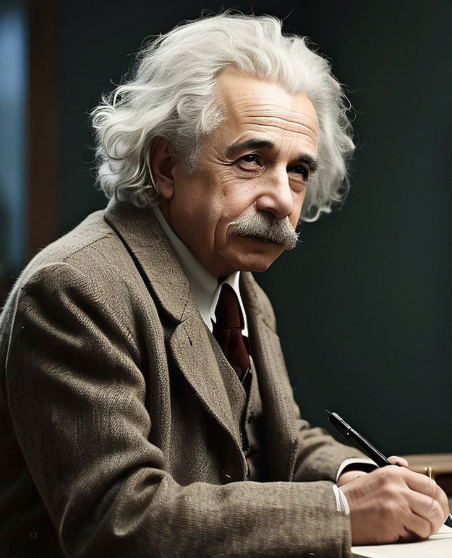From Theory to Screen with Netflix's "3 Body Problem": Exploring the Genius of
Albert Einstein
By Nida Kanwal
Albert Einstein, the renowned physicist whose name has become synonymous with genius, left an indelible mark on the world with his groundbreaking theories and revolutionary insights into the nature of the universe. His work continues to inspire awe and fascination, even in the modern era. Now, Netflix’s adaptation of Liu Cixin’s “The Three-Body Problem” trilogy brings together Einstein’s scientific legacy and the realm of entertainment in a captivating exploration of physics, philosophy, and the human condition.
Einstein’s contributions to science are vast and profound, but perhaps his most famous achievement is the theory of relativity. Published in 1905, his special theory of relativity fundamentally altered our understanding of space, time, and energy, introducing concepts like time dilation and the equivalence of mass and energy encapsulated in the famous equation E=mc². This theory laid the groundwork for his later development of the general theory of relativity, which provided a new understanding of gravity as the curvature of spacetime.
Netflix’s “3-Body Problem” series, based on Liu Cixin’s award-winning science fiction novels, delves into the complexities of physics and the mysteries of the universe, drawing inspiration from Einstein’s theories and their implications for humanity’s understanding of reality. The story follows a diverse cast of characters as they grapple with the enigmatic Trisolaran civilization and the existential threats it poses to humanity. Einstein’s influence on the narrative of “3-Body Problem” is profound, as his theories provide the conceptual framework for many of the scientific concepts explored in the series. From the nature of time and space to the possibility of extraterrestrial intelligence, Einstein’s ideas serve as a guiding light for both the characters within the story and the viewers at home.

One of the central themes of both Einstein’s work and “3 Body Problem” is the concept of the universe as a vast and mysterious entity governed by fundamental laws and principles. Einstein’s theories of relativity challenged conventional notions of space and time, suggesting that the universe is far more dynamic and interconnected than previously imagined. Similarly, “3 Body Problem” invites audiences to contemplate the profound implications of humanity’s place in the cosmos and the existential questions that arise when faced with the possibility of encountering advanced alien civilizations.
Moreover, both Einstein’s work and the “3 Body Problem” series provoke philosophical reflections on the nature of reality, the limits of human knowledge, and the ethical implications of scientific progress. Einstein himself was deeply engaged with philosophical inquiries, famously remarking that “the most incomprehensible thing about the universe is that it is comprehensible.” Similarly, “3 Body Problem” challenges viewers to confront the mysteries of existence and contemplate the ethical dilemmas posed by scientific discovery and technological advancement.
In bringing together the visionary genius of Albert Einstein and the imaginative storytelling of “3-Body Problem,” Netflix offers audiences a thought-provoking journey into the frontiers of science and fiction. Through compelling characters, dazzling visuals, and thought-provoking narratives, the series invites viewers to explore the mysteries of the universe and contemplate the profound insights of one of history’s greatest minds.
As Einstein himself once said, “The important thing is not to stop questioning. Curiosity has its own reason for existing.” With “3-Body Problem,” viewers are invited to embrace their curiosity and embark on an exhilarating voyage of discovery, guided by the timeless wisdom of Albert Einstein and the boundless imagination of science fiction.
You may be interested to read other articles: Fidelity Changes Course on Bitcoin, Unveiling the Evolution of Cryptocurrencies, Global Coffee Market, and GLAMOPH – Exploring Emotions in AI Art.


